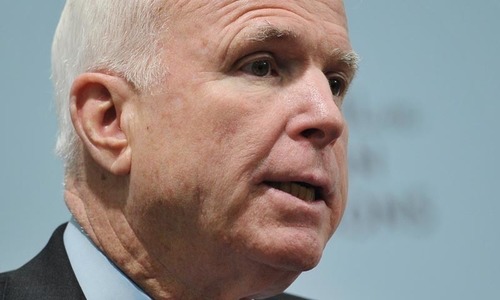ISLAMABAD: Pakistan on Friday rejected at the highest level criticism by the United States and Afghanistan that it was not doing enough to restore peace to the war-ravaged country and asserted that Kabul needed to establish its writ on its own territory.
“Pakistan continues to work for peace and progress in Afghanistan…and will continue to strive for return of normalcy in Afghanistan at the earliest. This, however, requires simultaneous efforts by the Afghan government for restoring effective control on its territory,” the National Security Committee (NSC) said in a statement after a meeting held with Prime Minister Nawaz Sharif in the chair.
This was the third meeting of the NSC in about six weeks, although the highest civil-military coordination forum has previously met irregularly during Mr Sharif’s tenure. Afghanistan has featured in all of the three meetings.
Third meeting of NSC in about six weeks highlights Pakistan’s efforts for peace in neighbouring country
The message that Pakistan was doing its part came ahead of the completion of the Trump administration’s review of policy on Afghanistan, which is widely expected to recommend a tough line on Pakistan to push it to give up its alleged support for the Taliban as US militarily surges in Afghanistan to support beleaguered Afghan security forces.
Washington and Kabul allege that the Afghan militant organisation and its ally Haqqani network continue to maintain sanctuaries in Pakistani territory from where they are sustaining insurgency in Afghanistan. The Taliban are presently controlling or having influence in nearly 40 per cent of Afghan territory. Furthermore, casualties suffered by Afghan security forces have risen to record levels.
Both the US and Afghanistan conveniently blame Pakistan for their failures.
The NSC message was consistent with the decision taken at an emergency security meeting at the GHQ on June 24, which had concluded: “while counterterrorism efforts by Pakistan continue, it is time now for the other stake holders, particularly Afghanistan to Do More”. On Friday, PM Sharif also chaired a policy session at the Foreign Office.
The NSC meeting was, therefore, an occasion to coordinate the positions of the civil and military leadership and convey a strong message to the US that any coercive or punitive action would be unacceptable.
“It was reiterated that Pakistan has acted as a frontline state in global counterterrorism efforts with unparalleled sacrifices and successes. No other country in the world has done as much for global safety and security as Pakistan at a huge cost of both men and material,” the NSC said in the statement recalling the sacrifices rendered by Pakistan while fighting terrorism.
“The sacrifices of security forces, law enforcement agencies and the national resolve in fighting the scourge of terrorism was acknowledged and appreciated during the meeting,” the statement said.
The committee linked “regional peace and progress” to resolution of all outstanding issues, including the Kashmir dispute.
Though not mentioned in the NSC statement, mutual mistrust between Pakistan and Afghanistan is also impeding progress towards the settlement of Afghan dispute. Pakistan accuses Afghanistan of allowing Pakistani terrorist groups — the Tehreek-i-Taliban Pakistan, the Jamaat-ul-Ahrar (JuA) and others — that had fled counterterrorism operations here to establish sanctuaries on Afghan soil.
Nuclear diplomacy
The NSC meeting was specially attended by Director General of the Strategic Plans Division (SPD) Lt Gen Mazhar Jamil.
The SPD chief is not a member of the NSC. His participation indicates that an agenda item related to the nuclear programme was discussed during the meeting although such matters are usually deliberated upon by the National Command Authority (NCA).
The NCA is also chaired by the prime minister and the SPD director general, by virtue of his office, is its secretary.
According to a source, the committee discussed matters related to nuclear diplomacy. The issue, it is said, came up as part of the foreign policy review that is being undertaken by the government.
Issues falling within the ambit of Pakistan’s nuclear diplomacy are its objections to start of international negotiations on the Fissile Material Cut-Off Treaty; participation in the International Atomic Energy Agency’s activities; its status and role in non-proliferation regime; implementation of the United Nations Security Council Resolution 1,540 that seeks to prevent proliferation of weapons of mass destruction and their delivery systems by non-state actors; export controls; safety and security of its programme and the quest for membership of the Nuclear Suppliers Group.
Published in Dawn, July 8th, 2017















































